
I'm back in London visiting friends for the holidays, when it occurs to me that not only does it not feel like home any more, I have no idea how my native city works.
I realize this for the first time when I go to cross the road and nearly cause a traffic accident. Cars, it seems, are not content to simply drive around pedestrians as they are in Shanghai.
"I forgot that everyone uses the zebra crossings here," I think sheepishly, as drivers beep their horns angrily at me. "The Brits are such sticklers for rules."
I have also, it transpires, forgotten how the Metro works and keep embarrassing myself by trying to pay for things in yuan. When I ask for soy milk in the local corner shop, the owner looks at me as though I'm crazy. At our family Christmas dinner, it strikes me how much I miss rice.
By the third day I have decided that my birth country is an alien land, loosely disguised by the fact that I can read everything that's written and understand what people say, if not what they mean. "It's like being in America," I think in amazement. "Only less fat."
'What's China like?'
At the same time, Shanghai feels very far away. I can feel my hard-won Mandarin receding with every glass of mulled wine. Sometimes I wonder if I made the whole thing up. "I don't belong anywhere now," I think sadly. "I'm lost, somewhere over the Caucasus."
During the course of the trip, I have nearly identical conversations with approximately two dozen friends and relatives. These consist of a series of well-meaning but impossible questions, to which I am able to provide only mildly unsatisfactory answers.
"So, what's China like then?" they ask.
Even after I hear the question several times, it still inspires a mild panic. I don't know where to start, plus, I'm aware of offering too much information, as I suspect that they are only asking to be polite.
"China's great!" I say. "You know, busy. Different."
The second thing people want to know is how good my Mandarin is, another area in which I inevitably disappoint. My uncle tells me that a friend's son spent six months in Chengdu in Sichuan Province and came back fluent after chatting to people at bus stops. I try to stifle a snort. "Well, it's the hardest thing I've ever learned," I say. "He must be very clever."
After a while I discover what people are most interested in are the strange things I may have eaten. "Let's see, sheep's intestine," I say. "Turtle. Sea cucumber. I haven't tried beef penis yet, although I've seen it on menus. I havent been brave enough to try dog meat either, though it's popular in winter."
All this, however, is really just preamble for the big question. They wait a while before dropping it in casually, like a grenade.
"So, when do you plan to come back?" they ask.
In actual fact, I don't know when I'll be coming back, but I worry that if I say this they may forget about me. "Why don't you come and visit!" I find myself saying maniacally to people I don't even like. "You can take my spare room!"
On my last night in London, my friends decide to visit a Chinese takeaway. These are very popular in the UK but would be unrecognizable to most people in China, given that the British understanding of the world's greatest cuisine is based mainly on three dishes: chicken chow mein, duck with pancakes and sweet-and-sour pork.
When we go to pay for the food, I feel my friend Sarah nudging me.
"Say something in Chinese!" she hisses, nodding to the server. I pretend not to hear. She nudges me again. "He's Chinese! You can practice your Chinese with him!" she says.
"Er, hello, do you speak pu tong hua (Mandarin)?" I say through gritted teeth.
The server looks at me quizzically. "He's probably Cantonese," I tell myself.
"Would you like rice or chips with that?" he asks in English.
My friend looks at me pityingly. "Don't worry, it must be a hard language," she says. "Definitely harder than French."

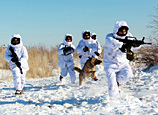
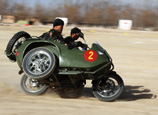
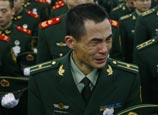
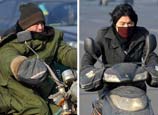


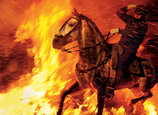






 Girl wearing "military uniform" parade on the street to publicize the new traffic regulation
Girl wearing "military uniform" parade on the street to publicize the new traffic regulation


![]()
